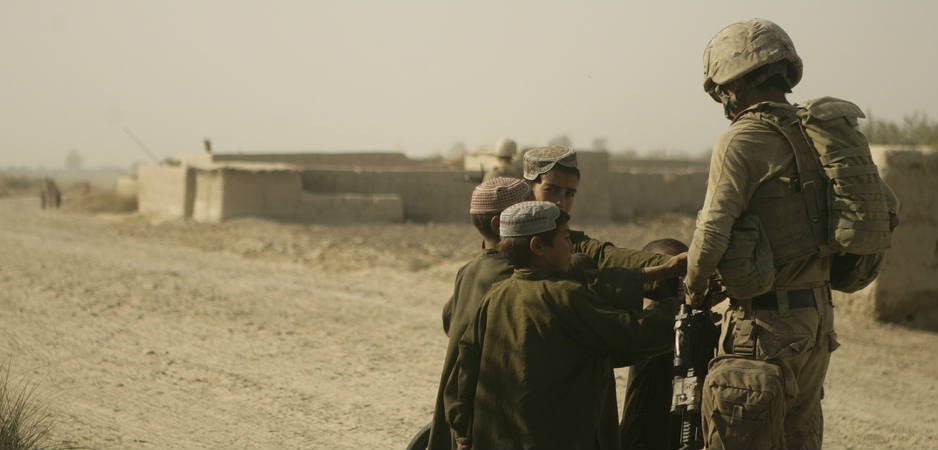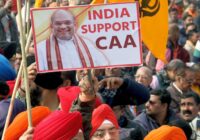Even after all the years of conflict, the battle for Helmand is something that locals find difficult to understand.
Lashkar-gah. Hospitals are tough. The disinfectant smell trapped inside these walls, along with that of plastic furniture, would flood anyone with a sense of anxiety. Yet here in Helmand, one of the most troubled provinces in Afghanistan, there is no space for laments and sorrows. “My job is to manage the pain, from the beginning, to the middle and after. Afghans never complain about pain. We have a ward full of kids, and you never see them crying,” says Joseph Rumley, the anaesthesiologist working with Emergency—an international medical charity who provide free health care to the victims of war in the province.
Indeed, suffering is a universal feeling. However, much of its extension depends on the relation between lack and desire, expectations and perception of self. “My biggest dream is to go home, have my family kill our own sheep, and eat it all together to celebrate my return,” says a 12-year-old girl, injured by a crossfire bullet while she was having breakfast with her mum and aunt in her house. She is from Marjah, one of the most highly-contested districts between the Taliban and the Afghan National forces.
A Different Destiny
For her, as well as for many of the young children living in these areas, it seems difficult to imagine something better than living peacefully with their family, gathered around a table heavy with food and drinks. Conflict has perforated the daily life of the local people so deeply, that sorrow has become a natural aspect of their existence. The knowledge and space for imagining a different destiny is something that does not belong either to their reality or to their dreams: “I never think about future. I never ask myself how and when all this will change. I have come to accept it, and I all I do is putting my faith in the hand of Allah,” says a man in his 50s, who is suffering from multiple injuries.
The battle for the control of Helmand, a Taliban’s traditional power base, has lasted for years and had lately intensified. Of the 14 districts, five have fallen to the Taliban and the others are heavily contested. Over 3,000 British forces in charge of defeating the insurgency in the area have left at the end of 2015, with the NATO-led Resolute Support mission coming to an end. Few of them remain working with the Afghan National Defense as strategy advisors, leaving the control of the military operation to the Afghan forces.
The Afghan National Army (ANA), backed by US airstrikes, is not present in sufficient numbers and struggles between lack of ammunitions and support from the national unity government. The reasons for this are difficult for the locals to understand. People speak about the capital Kabul as an outside world, far from their daily reality. The alienation is the result of a political unrest—of corruption, confusing strategies and perpetuation of an uncomfortable reality on the ground that goes to way back before the international troops started to withdraw.
If it is true that justice is the shield of the weak, Afghanistan seems to have regressed to a state of lawlessness, where few can enjoy life, an even the fittest struggle to survive. “The truth is that no one want to leave our country in peace,” says a young man stuck in the hospital bed for over two months due to a heavy leg fraction. Heavily medicated, he is ranting against foreign powers, unidentified local enemies and his right to pain. Because even pain in Helmand has become a luxury.
“I do not know what to think about my life. I have no hope in something different, I just deal with that,” says Chaista, a 19-year-old nurse, as she dresses the wounds of a child; like many other Afghans, she goes by just one name. Her life is divided between the walls of this hospital and her home in a village nearby. The fear that RPGs might hit her courtyard at night has become coexistent with her need for sleep. There is no space left for other thoughts and dramatic reflections. Children around her are dying in the minefields as they go to buy bread. Women are caught in the crossfire inside their homes—an environment that is supposed to be sacred and secure. Men are repeatedly injured on the battlefield: once, twice, maybe more, until they die.
A Surreal Struggle for Life
Life, whatever it means, must go on. “We did not see any changes in the past decade. It has always been like that, and probably will always be,” says Tawus, the head of local nurses at Emergency hospital. He, as many of his colleagues, does not see his work as simply a job. Free medical assistance, they all say, is the only kind of support they can give to their people.
In a surreal struggle for life, the maintenance of a functional body has become the last sign of presence given to human dignity. To those who visit their loved ones in hospital, this attempt is demonstrated by wearing their best dress: “Family is very supportive here, many comes from far away villages although the roads are very dangerous,” says Vesna Nestorovic, the medical coordinator of Emergency.
Yet, the sparkling of traditional local hats and hijabs can’t cover the dirt left as a sign of a struggling existence filled by a tormented resignation. While the international community was focused on removing cultural barriers, challenging the Afghan traditional way of life, it has failed to guarantee the conditions for an environment that allows any man to imagine something little more than bare survival. This is why, after years, the battle for Helmand is something that locals find difficult to understand.
No one has ever asked for their opinions. No one has ever listened to their laments. Even now, both belligerent sides keep failing to warn civilians of the beginning of their military operations, and bullets enter living rooms, interrupting the most normal daily activities. If freedom was the main objective of the international community, the world should know that after 15 years of intervention, Afghans still not have the freedom to cope with their grief. And yes, they have surrendered to that, not to anything else.
The views expressed in this article are the author’s own and do not necessarily reflect Fair Observer’s editorial policy.
Photo Credit: ResoluteSupportMedia / Flickr
 We bring you perspectives from around the world. Help us to inform and educate. Your donation is tax-deductible. Join over 400 people to become a donor or you could choose to be a sponsor.
We bring you perspectives from around the world. Help us to inform and educate. Your donation is tax-deductible. Join over 400 people to become a donor or you could choose to be a sponsor.
Support Fair Observer
We rely on your support for our independence, diversity and quality.
For more than 10 years, Fair Observer has been free, fair and independent. No billionaire owns us, no advertisers control us. We are a reader-supported nonprofit. Unlike many other publications, we keep our content free for readers regardless of where they live or whether they can afford to pay. We have no paywalls and no ads.
In the post-truth era of fake news, echo chambers and filter bubbles, we publish a plurality of perspectives from around the world. Anyone can publish with us, but everyone goes through a rigorous editorial process. So, you get fact-checked, well-reasoned content instead of noise.
We publish 2,500+ voices from 90+ countries. We also conduct education and training programs
on subjects ranging from digital media and journalism to writing and critical thinking. This
doesn’t come cheap. Servers, editors, trainers and web developers cost
money.
Please consider supporting us on a regular basis as a recurring donor or a
sustaining member.
Will you support FO’s journalism?
We rely on your support for our independence, diversity and quality.






